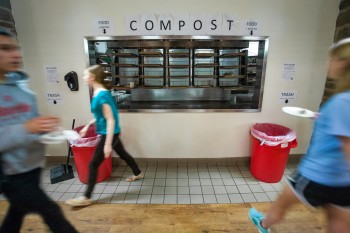Composting in the DC

Photo: Thom Carroll
Details
Some new signs in the Dining Center are calling attention to a new composting effort spearheaded by Haverford's Committee for Environmental Responsibility (CER). The trial program, launched at the end of the fall semester, aims to divert food and other compostable materials out of landfills and turn it into usable compost. To do that, the College has contracted with local firm Philly Compost, which began pick-ups at Bryn Mawr College's dining center last year and has now added Haverford to its schedule.
“We really have to train the students,” says campus Sustainability Coordinator Claudia Kent, who worked with members of the CER to put out bright red trash barrels, create instructional signs, and distribute“We're On Trial” buttons as part of an awareness campaign.“Now, before you put your tray on the conveyor belt, you have separate out the trash.” Plastic, foil, and coated paper items (such as ice cream and cupcake wrappers), go into the red cans. Food, as well as paper napkins and other kinds non-coated paper, stays on the plate to be sent into the kitchen where the staff will scrape it into special compost containers.“If the kids don't do a good job, Philly Compost can reject the containers,” Kent says.
The aim of the trial is to determine if the composting effort can be done in a way that does not make more work for the Dining Center staff, and is cost neutral. The hope is that the savings realized by reducing trash pickups will offset fees paid to Philly Compost. CER members are hoping the trial will be successful, and that food waste composting will become a permanent part of the Dining Services operation.“Haverford currently sends an average of 20,000 pounds of food waste per month to landfills,” says CER member Eleanor Durfee '14.“By composting, it will instead be used to create healthier soils.”
—Eils Lotozo
This article originally appeared in the Winter 2014 issue of Haverford magazine.



